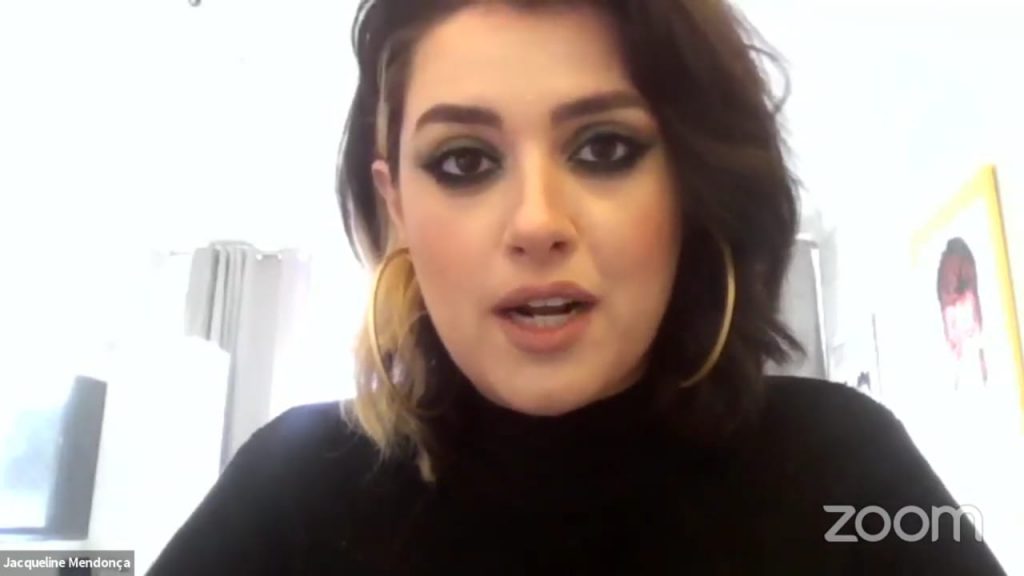São Paulo – The growing relevance of the internet in product sales and marketing can be a facilitator when it comes to branching out into the Arab countries. This was one of the issues discussed by Hussein Mohieldin, the CEO with startup company Robusta, a Egypt’s corporate e-commerce solutions provider, during a webinar hosted by the Arab Brazilian Chamber of Commerce this Wednesday (27).
During the webinar themed “Digital Transformation in times of crisis: change and adaptability,” Mohieldin responded to inquiries from Adélia Mendonça Cosmetics CEO Jacqueline Mendonça (pictured at the top of this page). The Brazilian brand’s website employs user experience-oriented resources, including an online consulting outfit which works on product suggestions from customers. “How can one go about bringing this kind of more user-specific experience to Arab countries?”, asked Mendonça.
Mohieldin said a successful expansion entails exploring online tools. “Right now we have tools like simultaneous translation online, which means we are breaking town the language barrier. You can have chatbots and offer translated services to people in Egypt or other Arab countries,” said Mohieldin. A chatbot is a communication software providing fast responses to customers while simulating human interaction.
He also pointed out other virtual reality resources for the cosmetics industry. “People will often prefer going to the store, but through virtual reality you can enable people to try out makeup or clothing. Shoppers can have a conversation with a consultant, with simultaneous translation into Arabic, and the communication will just flow,” he said, Mohieldin advises brands to have websites in the local language. “Many people understand Arabic, but not English, so you need to translate into Arabic,” he said.
But the people utilizing the technology are also key. Mohieldin believes beauty and fashion companies need to connect with digital influencers in the countries they are targeting. “These people understand the trends and they know what shoppers are looking for. This is important in adapting, figuring out people’s behavior and being able to connect. And you also need to inform your clients about the quality of your product in these countries,” he concluded.
Alaa Kara Ali, the CEO with Brazilian products-oriented shop Metro Brazil, was also featured in the webinar. He asked about getting in touch with Arab influencers. He said demand for Brazilian items is going strong amid the pandemic, with 100 orders delivered during the Ramadan period.
Mohieldin explained that brands can get directly in contact with individual Arab influencers. On the other hand, one can hire out a local agency specializing in digital influencers. “These companies categorize influencers according to reach, region, follower profile and targeted demographics. Some influencers speak to students, others to fashionistas. You can tailor this to match your business by working on your marketing strategies with these agencies,” he said.
The CEO for Robusta noted that each place requires a different strategy. “There is no question that each country is different. The way we do business in Germany is different than the way we do business in Egypt. There are similarities between some countries, but each country has a different interpretation on engagement, quality, and pricing. We will often take an approach that works in Egypt and bring it to Brazil, and that may or may not work,” said Mohieldin.
Also featured in the webinar, The Digital Strategy Company chief scientist and Cesar School professor emeritus Silvio Meira endorsed Hussein’s words. “You’re selling a culture to another culture. If you don’t work on cultural translation and insertion, including the technological aspects, and if you don’t optimize your searches for Arabic, you will not be found. This means you need to understand how Arabic searches work. Youhave your Arabic search in Egypt, or your Arabic search in Jordan. This is the type of work that Robusta does,” he said.
Arab Chamber president Rubens Hannun, who moderated the discussion alongside secretary-general Tamer Mansour, stressed the relevance of services such as translation into Arabic, which the Chamber supplies to its members. he told the Adélia Mendonça Cosmetics CEO that she can count on the Chamber to gain a better grasp of Arab shopping culture. Also featured in the webinar was Solinftec CEO Rodrigo Iafelice dos Santos.
Click on the links for more on the webinar and for the full webinar on YouTube.
Digital transformation drives change in consumption
Covid-19 brings businesses to digital world
Translated by Gabriel Pomerancblum









